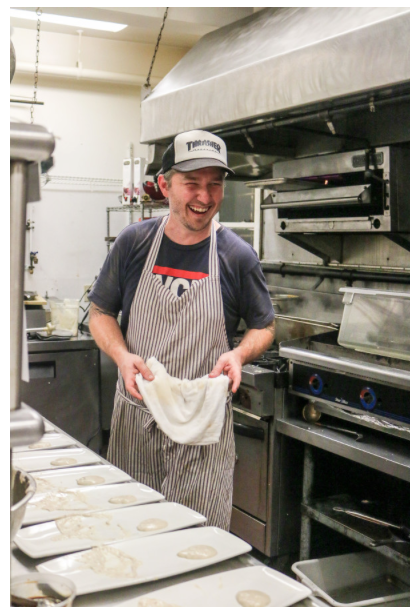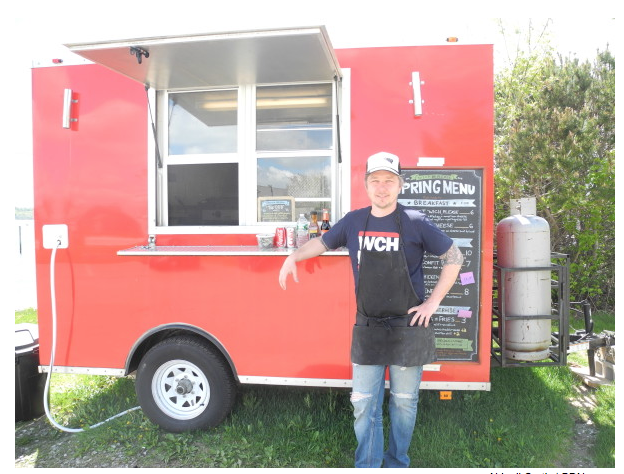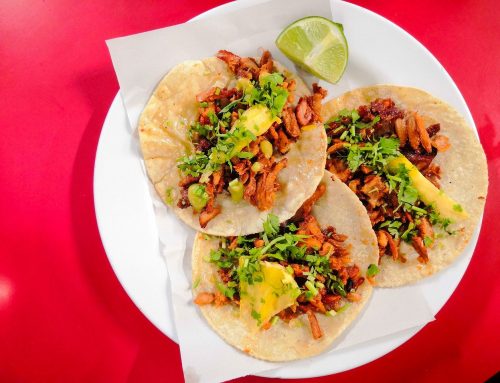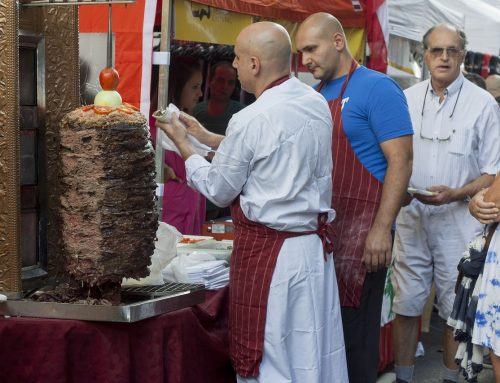Thanks in part to the rise of some truly excellent modern food television programming, and the elevation of celebrity chefs to almost cult-like status, with lucrative book deals, wildly popular Instagrammable restaurants, and branded lines of barbecue rubs, everyone with a passion for cooking sooner or later wonders if they should make the leap into cooking full-time.
After all, our chef-worshipping culture makes it seem so easy, right? Forget culinary school, spending years learning technique and theory and then climbing your way painfully through the ranks of the French brigade system, when all you need is a few dopey catchphrases for Target to come calling with a deal to launch your own line of moderately-priced enamel cookware, right?
Listen, I get it. My background was in design and marketing, until one day I decided to walk out of my cubicle (hopefully for good), and earn my living on the edge of a knife, both literally and metaphorically. For years, I let the moderate acclaim awarded to my meandering food blogs and the slight attention being paid in the press to my efforts get under my skin, and convince me that I had the chops needed to set the world on fire with my cooking. Overall? It’s one of the biggest, most satisfying leaps of faith I’ve made so far in my career. But making a living cooking food isn’t always all it’s cracked up to be. Before you flush your totally respectable, safe, and stable career down the toilet in service to your dreams, here are a few things to consider:
The food business is pretty gross.
We’ve all seen the movies and television shows. As a master chef, running your own kitchen, you’ll be standing at the pass, wearing an impeccably clean white chef’s coat with your name embroidered on it, inspecting each plate for quality before it’s picked up by your loyal waitstaff and whisked away to a room of eternally grateful diners, while you wait to nurse a shift drink at the bar full of customers all waiting to congratulate you on your success.
The reality is a bit different. Until you have a staff that’s slavishly devoted to executing your vision, you are going to be doing all of the work yourself. This doesn’t mean just the fun, showy stuff, like when you squirt white wine into a saucepan and it flames up while the alcohol cooks off; it means you’ll spend a lot of time doing things like scraping grease off of flat-top grills, emptying fat traps on the exhaust unit, scooping sludge with your hands out of the bottom of your deep fryer, and pitching in on more dishes than you’ve ever seen in your life.
You’ll have to mop fish guts out of the floor of the walk-in, clean out prep pans full of moldy Russian dressing, and polish miles and miles of stainless steel. Have you ever been covered with maggots on a sweltering day in August after your dumpster service inexplicably didn’t show up for a week? You will. Have you ever been so hot that sweat runs into your eyes, temporarily blinding you with saltiness until you can sneak a minute to dump a bottle of cold water over your head? What if every item of clothing you owned smelled vaguely and permanently of French fries? These are all of the less-than-glamorous things you can look forward to, in your new life starting out as a cook.

The author of this post, Malcolm Bedell, doing his thing.
Managing staff can be a nightmare.
Unless you’re planning on running a one-person show (and there’s really no way to do that, and keep scaling and growing your business), you’re going to need to hire staff, at some point. And managing staff can be a full-time job unto itself. Unlike you, your staff isn’t devoted wholeheartedly to helping your business become a success; to them, it’s just a job, that sort-of pays the bills, and that they’ll show up to when it’s convenient for them. This isn’t a sweeping generalization, but for the most part, what you can afford to pay your staff means you probably won’t be attracting the most high-achieving individuals on the planet.
Much of your day will be devoted to helping manage their lives, in addition to keeping your business running at least somewhat smoothly. At some point, your hostess won’t show up because her boyfriend who hits her took off with the car, and her backup isn’t available because she only gets to see her kids on Monday, Wednesday and Friday, and besides, she doesn’t get along with one of your servers, who once called her a whore during service and wouldn’t run into the walk-in to grab her an extra side of dressing that one time. Managing all of these personalities can easily turn into a full-time job, all on its own.
You’ll be amazed how much of your life as a cook is spent doing anything but cooking.
Think you’ll be spending all of your time behind the line, whipping sautee pans around and working on your knife skills? Think again. Here’s a typical Tuesday:
It’s 6:30 in the morning, and you’ve come in early to get all of the prep done that you need for a really cool, creative lunch special you’re rolling out that day. Before you begin, you notice that the new closer you hired has put away all of your knives and bowls in the wrong places, and while you hunt around for them, you remember that Tuesdays are when you place your food order, and you need to grab your order sheet and do an impromptu inventory in order to make your deadline.
While you are checking every item off the list, your phone rings and your dairy vendor tells you that they need your order for the week in the next ten minutes, so you put the main inventory on hold while you count how many quarts of half-and-half you have left. Before you start that, though, you throw some butter in a pan, to start the roux for this really interesting North African peanut sauce you’re making, before heading into the storage room to find that the previous day’s order hasn’t been put away, and you’ve got 100 pounds of thawing meat spilling blood onto your concrete floor.
You put one of the kids on that task, then return to the front of the house to find the Health Inspector waiting for you, who wants to inspect your walk-in to make sure you’ve got labels and dates on all of your prepped product. You distract him for a minute, yell at one of your dishwashers to get every godamned unlabeled sauce in the trash in 30 seconds, then stir the flour into your roux as you walk by. You’ve managed to place both your produce and dairy orders, but for some reason, the water from the tap is running brown and setting off alarms in the pump room, so you grab a wrench and go pretend to open and close a few valves, as though somehow “thinking about plumbing” is the same thing as “being a plumber.”
By now, the flour in your roux is browned slightly, and you can continue building your sauce, but you also find that no one has prepped any cucumber slices for service, so you also begin slicing 20 pounds of cucumbers, while your sauce thickens and threatens to burn and you sit on the phone on hold with a reporter that wants to do a story on your restaurant. Someone drops a huge load of wet potatoes into your deep-fryer, which bubbles over and spills slippery hot oil all over the floor, so you throw some Kosher salt down on the floor to keep the dishwasher from breaking his wrist and work through it, making a mental note to do a thorough deep-cleaning during the post-lunch slowdown.
You’re now two hours away from service, you’ve cooked almost no actual food, and the customers are starting to trickle in.

Catering works great for food trucks and restaurants.
It’s shockingly easy to go completely broke.
Even the most mathematically-inclined, careful minds are surprised by how easy it is to lose shocking amounts of money in the food business. Even if you’ve planned for every eventuality, counted every napkin, calculated your food costs down to the gram, and are convinced you’ve got enough money to run a lean, mean operation, unexpected crises have a way of rearing their ugly heads at the worst possible moment.
Took a gamble on bulk-purchasing 200 pounds of freshly-caught halibut? That’s when the fan on your walk-in compressor will suddenly die, and need $4,000 worth of repairs. Your meat vendor suddenly decides that he’ll only make deliveries COD, your prep cook wants a raise, and winter is coming, so you’ll have to factor in heating costs soon. Oh, and did you know that if you refrigerate the lines to your beer taps, you’ll get 30% more drinkable product out of each keg, but only if you spend thousands upgrading your tap system? The financial structure of restaurants often means that you are playing a constant game of cat-and-mouse, and it doesn’t take much to suddenly and unexpectedly bury you financially.
Make no mistake about it: Make the decision to join the restaurant business, and you will worker harder, longer, and for less money that you ever have in your life. With that said…
Cooking for a living can be one of the most satisfying things you’ve ever done for a living.
There’s a moment that happens sometimes hundreds of times, every single day: Your team works together to put out a plate that you’re happy with, after sweating and toiling through a difficult service. You or your staff sets it down in front of the customer, who has been waiting patiently for the food they ordered. Maybe it’s not something they’re familiar with, or something they’d typically order. But they have enough confidence in your ability to step one toe outside of their comfort zone, give themselves over to the process, and try something new. The plate gets set down in front of them, and you get to enjoy that one moment, where their eyes flash with brightness. They pause to take a picture for Instagram, then close their eyes to take that first bite, throwing their head back in ecstasy at the pleasures of that single bite of food, that they have waited for and that has been the result of hours of preparation, appreciating that single meal that a few hours earlier, hadn’t even existed anywhere but in your imagination. It’s all been worth it to them, and for that one single moment, it’s worth it to you, too.
The process of taking a dish from concept to reality, and then having an appreciative customer thoroughly enjoy what you have created, is one of the single most satisfying things I’ve ever done. It’s a job that provides near-constant, real-time feedback on your performance, and when it goes even somewhat according to plan, can be rewarding in a way that very few people understand. If you can overlook the chaos that surrounds that single moment, the blood and sweat and stress that went into creating it, and continue to appreciate and be grateful for it each and every single time it happens, than perhaps cooking for a living is for you, after all.




